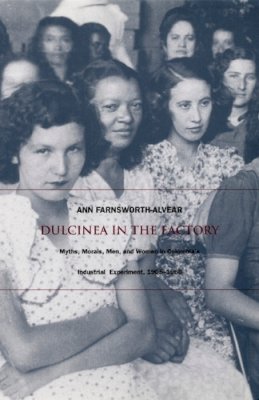
Dulcinea in the Factory: Myths, Morals, Men, and Women in Colombia’s Industrial Experiment, 1905–1960 (Comparative and International Working-Class History)
Ann Farnsworth-Alvear
Ann Farnsworth-Alvear’s analyses of archived personnel records, internal factory correspondence, printed regulations, and company magazines are combined with illuminating interviews with retired workers to allow a detailed reconstruction of the world behind the mill gate. In a place where the distinction between virgins and nonvirgins organized the labor market for women, the distance between chaste and unchaste behavior underlay a moral code that shaped working women’s self-perceptions. Farnsworth-Alvear challenges the reader to understand gender not as an opposition between female and male but rather as a normative field, marked by “proper” and “improper” ways of being female or male. Disputing the idea that the shift in the mills’ workforce over several decades from mainly women to almost exclusively men was based solely on economic factors, the author shows how gender and class, as social practices, converged to shape industrial development itself.
Innovative in its creative employment of subtle and complex material, Dulcinea in the Factory addresses long-standing debates within labor history about proletarianization and work culture. This book’s focus on Colombia will make it valuable to Latin Americanists, but it will also appeal to a wide readership beyond Latin American and labor studies, including historians and sociologists, as well as students of women’s studies, social movements, and anthropology.
Product Details
About Ann Farnsworth-Alvear
Reviews for Dulcinea in the Factory: Myths, Morals, Men, and Women in Colombia’s Industrial Experiment, 1905–1960 (Comparative and International Working-Class History)
Mary Roldán
Hispanic American Historical Review
“[I]n her analysis of the development of the different stages of industrial capitalism in Medellín, the author skillfully unravels the social negotiations between capitalist and worker, and in the process she does something that many engendered studies fail to accomplish: she demonstrates rather than merely asserts that gender really does matter in social relations and can have an important effect on economic processes and political outcomes. . . . Although well-grounded in feminist theory and the cultural studies literature, in its eclectic use of sources and broad vision, this book conveys a sense of the totality of the past, a sense that is the essence of the historical enterprise itself.”
James P. Brennan
American Historical Review
“Ann Farnsworth-Alvear’s well-written and carefully-argued study of Medillín’s textile industry makes crucial interventions in gender and labor history. . . . Farnsworth-Alvear has produced an important book that adds to the vibrant literature on gender and labor in Latin America. Her insights on the complexity of worker consciousness will doubtless spur healthy debates on how best to apprehend workers’ lives.”
Karin Alejandra Rosemblatt
The Americas
